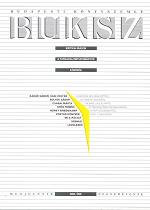Birgitta from Sweden and the Italian "Poet-Kings"
Svédországi szent Birgitta és az olasz „költőkirályok”
Keywords: Avignon; Birgitta; Bocaccio; Kardinal; Dante; Papst; Petrarca; Privatoffenbarung; Schiwy.
In einigen katholischen Gemeinden scheint die Fröm¬migkeit der heiligen Birgitta wieder aktuell zu sein. Es ist immer vorteilhaft, die Heiligen auch in ihrem historischen Rahmen kennenzulernen. Diese Ar¬beit hat schon Günther Schiwy in seinem Werk: „Birgitta von Schweden”, 2007 (Beck, München) geleistet. Er vergleicht dabei das Frauenbild der Heiligen mit jenem ihrer Zeitgenossen: Dante, Petrarca und Bocaccio. Meiner Meinung nach besteht die geistige Nähe zu den „Dichterkönigen” eher in der Schilderung der kirchlichen Missstände, wobei sie seitens Birgitta eine Ermahnung aufgrund ihrer Privatoffenbarungen darstellt.
More...
